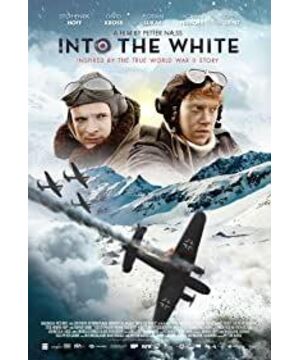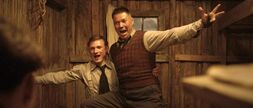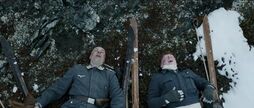Being in a group, perhaps out of common interests, perhaps out of common values, or perhaps because of the "elephant in the room" that automatically silences, the individuals in the group have lost the independent judgment and decision-making ability that individuals should have. Disengagement from the collective allowed the two groups of pilots to find their voices. In the process of softening their positions, they still advocate force. Whoever holds the weapon will have the hegemony of discourse. It is not an exaggeration to use the phrase "power emerges from the barrel of a gun" - this is actually common sense, a nonsense, but it is completely at a disadvantage compared to the strength of the other side, I still dare to say It takes a lot of courage to come out, and you need to turn a blind eye to the elephant in the room. When the British took the pistols and turned the Germans into prisoners, German Lieutenant Schopis said that you should follow the Geneva Accords and treat prisoners of war preferentially, which is what he has been doing before. This gentleman's agreement that adheres to the spirit of the contract has not been abandoned by them. On the Anglo-German battlefield, the British were in a passive position, but in this small room, if they took away the weapons, they were in the active position and had an undisputed right to speak. So, British shooter Smith began to ask questions.
He pulled a chair across the center of the room and dropped it with a heavy weight. He taunted him defiantly: "How does it feel when the Germans occupy so much land?" German lieutenant Schopis hesitated and replied: "I don't You know, I'm just a pilot." This answer is quite tasteful, he doesn't say "how are we Germans?" The big picture, ready to represent all Germans, kidnapped and smeared by collectivism It's the most objective, rigorous, sincere answer with a little guilt and escape from a personal perspective. But the Brits won't give up, Davenport said, think about it. Schopis replied that I was just taking orders. This question and answer explains the reason for the infinite expansion of the scale of the war-citizens have the obligation to join the army and defend the country. After joining the army, they become soldiers, and they have to obey orders as their duty. After such a set of procedures, any reflection, convergence and Rationality is out of date, it increases the enemy's morale and destroys its own prestige, and it needs to be punished by various means. Smith then asked, "So when do you think Hitler will stop aggression? Until he takes China?" Schopis replied maybe. Once the war begins, it will intensify. It will not stop and converge automatically, but will continue to expand and become involved in all kinds of complicated relationships, all kinds of despicable and insidious tricks, and contests of all kinds of resources. Schopis's answer made Smith feel broken. It seemed that he could only be involved and submerged by the times. When he was broken, he said a broken swear word, but presented an unbelievable absurdity: "What the hell is he doing occupying China? You listen again. I don’t understand Chinese.” The previous topic revealed the absurdity of war and the reason for its infinite expansion, but the following dialogue removed the absurdity and presented the most essential and barbaric motive for war, which is plunder. Schopis said that what Germany is doing is what Britain used to do, and we are here to stop your British Empire from plundering Norwegian resources to meet the needs of German industry and build ships, planes, and bombs.
Originally thought that he represented justice and questioned the other side with just words, but in the end, the draw was a tie, which only proved that neither country was a good thing.
Among the five people in the small room were three German pilots, German Lieutenant Schopis, Sergeant Strunk, and Inspector Schwarz. There were two British pilots, British Captain Davenport and shooter Smith. They all have their own implied meanings. Strunk and Davenport represent the most typical German and British images respectively. Schwarz represents the bloody young people who were brainwashed by Hitler and believed in collectivism. Smith represents active, creative, disruptive, and personal. Young people with thinking and judgment, only Schopis transcends the boundaries of countries, individuals, and groups, transcends entities and practical interests, and represents a rationality and an order. For this reason, he prevented Schwarz from shooting and killing the British pilot when he first met, and he remained tolerant and rational in his later interactions.
In short, after all kinds of hostility, defense, and temptation, they began to discover each other's interesting, special personality, understand each other, become friends, and find the simple happiness and friendship of the past. But this can only happen in this little house that lacks food, it is a paradise, but it cannot stay out of the war for the whole order of the earth. When Schopis told Davenport that his friend and wife betrayed him and eloped abroad, Schwarz, who lost a shoulder, appeared in the background, implying that all the good things in front of him are only temporary and not long-term. Big Brother is always watching you, Even if you escape to the horizon, I will take you back. However, from another aspect, it can also be seen as when a person awakens, escapes from collectivism, and finally returns to personal thinking, emotion and vulnerability, Big Brother is very hurt. This film should emphasize the former meaning. You think you're back to yourself, simple joy and friendship, that you've successfully defected from the collective consciousness, and finally that crisp gunshot shatters the good, declaring that it's all just an illusory dream. Strunk died in his most innocent joy and simplicity. I don't know if it was his personal misfortune, or the misfortune of the collective and the times.
View more about Into the White reviews











